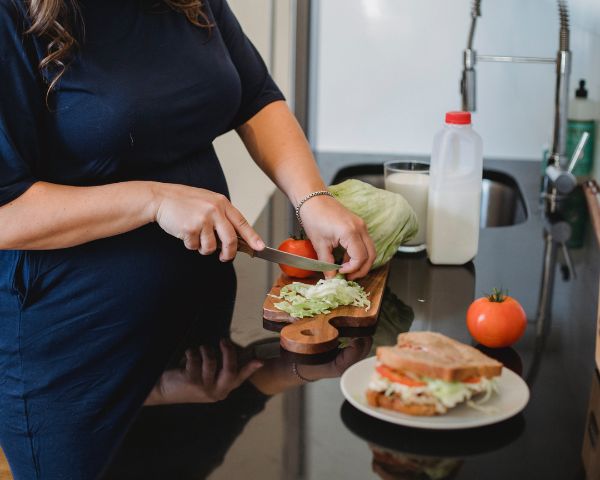Motherhood: though one of life’s most rewarding experiences, can come with a level of discomfort and unease. A common complaint of expecting mothers is nausea during pregnancy— especially in the first trimester of pregnancy. This can be extremely debilitating, making it difficult to go about daily life. But fear not! This comprehensive guide is here to help you identify the potential causes and treatments for nausea during pregnancy.
From dietary changes to natural remedies and medications, you’ll find the answers to your questions and the relief that you need. Get ready to learn about what helps with nausea during pregnancy; your ultimate guide awaits! So, without further ado, let’s dive right in!
Another common encounter in pregnancy is constipation. Here we share information on constipation in pregnancy as well as steps you can take to reduce constipation during your pregnancy.
Eating Small, Frequent Meals Throughout the Day Can Help Reduce Morning Sickness
Your body is going through a lot, and it’s understandable that you might be feeling nauseous. But there are ways to help! One thing that can really help with nausea during pregnancy is eating small, frequent meals throughout the day. This helps to keep blood sugar levels steady, which can reduce morning sickness. It also helps prevent malnutrition and dehydration. Eating meals that have high protein content and low fat can also help. Avoiding highly processed foods and eating more fresh, whole foods can really help with morning sickness too!
Drinking Plenty of Fluids Is Also Important for Managing Morning Sickness During Pregnancy
As with anything else related to your pregnancy, there are lots of different things that might help with nausea. If one remedy doesn’t work, don’t give up—try another!
Drinking plenty of fluids is one way to manage your symptoms and keep yourself hydrated at the same time. This is important because dehydration can make your symptoms worse by making it harder for your body to process any food you do manage to eat. You may want to avoid caffeinated drinks like coffee and tea, as these may make nausea worse instead of better.
If drinking plain water isn’t enough for you, try adding some lemon juice or slices of ginger root into it! Ginger has been shown to treat nausea in many studies, so this could be a good option for those who prefer something sweet over bland-tasting water alone.
Rest and Avoiding Stressful Situations
Nausea in pregnancy is a common, often debilitating symptom that women experience during their pregnancies. The good news is, there are ways to manage it. One of the best ways to do this is to get plenty of rest and avoid stressful situations or experiences.
The most important step towards dealing with nausea in pregnancy is simply getting enough sleep at night. This can be difficult because you may have trouble sleeping due to hyperemesis gravidarum, which is severe, persistent nausea and vomiting. Getting enough sleep will help keep your body rested and ready for more difficult days ahead when you might be feeling sicker than usual.
Another thing that helps with nausea during pregnancy is avoiding stressful situations. When you’re feeling sick, the last thing you want to do is go into an especially busy day at work or school (or both). It can be tempting to push through it all anyway, but doing so could end up causing more stress on top of everything else—which will only make things worse!
If possible, try finding ways around these types of situations until after birth has happened, and your body has recovered from the trauma of childbirth (and any subsequent postpartum depression). By following these essential tips, you can reduce the risk of feeling nauseous during pregnancy and make sure your body has time to heal from the stress of childbirth!
What Does Morning Sickness Feels Like?

Morning sickness is a common symptom experienced by many women during pregnancy. It typically occurs in the first trimester and can range from mild to severe. While the exact cause of morning sickness is not fully understood, it is thought to be related to the increase in hormones during pregnancy.
Vomiting
For many women, the most noticeable symptom of morning sickness is vomiting. This can range from a few dry heaves in the morning to multiple episodes of vomiting throughout the day. Some women may find that they are more likely to vomit after eating certain foods or smells, while others may experience vomiting with no apparent trigger. In severe cases, vomiting can lead to dehydration and malnutrition if not properly managed.
Loss of appetite
In addition to vomiting, many women also experience a loss of appetite during morning sickness. This can be due to nausea and vomiting, as well as a lack of appetite for certain foods— especially those that are typically considered “tempting” during pregnancy. This loss of appetite is often temporary and will resolve as nausea subsides in most cases.
Some women may also find that they are unable to eat much at all, while others may crave certain foods and eat more than usual. In either case, it is important to stay hydrated, maintain a balanced diet, and avoid skipping meals. If you are experiencing nausea and vomiting throughout the day, it may be helpful to eat small amounts of food more frequently throughout the day.
Food aversions
Another common symptom of morning sickness is food aversions. This means that certain foods or smells may cause a woman to feel nauseous or even vomit. These aversions can vary from person to person and may change throughout the pregnancy.
In essence, morning sickness is a common and often unpleasant symptom experienced by many women during pregnancy. It can cause vomiting, loss of appetite, and food aversions. While it can be difficult to manage, it is important to try to eat a balanced diet and stay hydrated to ensure the health of both the mother and baby. It is also important to speak with a healthcare provider if the symptoms of morning sickness are severe or persist for an extended period of time.

What Causes Morning Sickness?
Hormonal Changes
One of the main causes of morning sickness nausea is the increase in pregnancy hormones, specifically human chorionic gonadotropin (hCG) and estrogen. These hormones can cause an increase in the production of stomach acid, leading to nausea and vomiting.
Gastric Distress
Morning sickness can also be caused by changes in the digestive system during pregnancy. The increased blood flow to the digestive system can cause the muscles in the intestines to relax, leading to slower digestion and feelings of bloating and discomfort.
Nutritional Deficiencies
Pregnant women may also experience morning sickness due to nutritional deficiencies, specifically a lack of iron or B vitamins. These nutrients are important for both the mother and the developing baby, and a deficiency can lead to feelings of nausea and vomiting.
Stress
Pregnancy can be a stressful time for many women, and this stress can contribute to morning sickness. High levels of stress can interfere with the body’s digestion and cause feelings of nausea and vomiting.
It’s important to note that not all women will experience morning sickness, and the severity can vary from person to person. If you are experiencing morning sickness and it is causing you discomfort, it’s important to talk to your healthcare provider for guidance and support.

Do Certain Foods Cause Pregnancy Nausea?
Pregnancy nausea—also known as morning sickness—is a common issue for many expecting mothers. While the exact cause of pregnancy nausea is not fully understood, there are several factors that may contribute to its development. One of these factors is the food that a pregnant woman consumes. In this blog, we will explore whether certain foods may cause pregnancy nausea and how they may affect expectant mothers.
1. Dairy Products
Dairy products are a common trigger for pregnancy nausea. This may be due to the high-fat content of many dairy products, which can slow down digestion and lead to feelings of nausea. Additionally, some pregnant women may have a sensitivity to lactose, a sugar found in milk and dairy products, which can cause digestive issues and lead to nausea.
If you are experiencing pregnancy nausea and believe dairy products may be the cause, it is important to speak with your healthcare provider about your options. There are many lactose-free alternatives available, such as lactose-free milk and cheeses, that can help reduce the risk of nausea.
2. Spicy Foods
It’s common for pregnant ladies to have an aversion to spicy foods during pregnancy. This may be due to the strong and often overpowering flavors of spicy foods— they can be too intense for some women.
Spicy foods can also cause heartburn, which is another reason why pregnant women often avoid them. If you are craving spicy food and have decided to indulge in a little bit of heat, try eating it before or after meals so that it doesn’t interfere with your digestion.
3. Processed and Fried Foods
Processed and fried foods are often high in fat and additives, which can be difficult to digest and cause pregnancy nausea. These types of foods can also contribute to heartburn and indigestion, which can further exacerbate feelings of nausea.
If you are experiencing pregnancy nausea and suspect that processed and fried foods may be the cause, it may be helpful to try eating more whole, unprocessed foods. These types of foods are typically easier to digest and may help reduce symptoms of nausea.
4. Certain Types of Seafood
Certain types of seafood may also cause pregnancy nausea. This is often due to the high levels of mercury found in some types of fish, such as swordfish, sharks, and king mackerel. Mercury can be harmful to a developing baby and may cause nausea in expectant mothers—particularly in those who are pregnant for the first time. It’s important to check with your doctor before eating any type of fish during pregnancy.
In conclusion, while certain foods may contribute to pregnancy nausea for some individuals, it is important to note that each person is different and may have different sensitivities.
In fact, there is some evidence to suggest that certain foods may be more likely to cause pregnancy nausea than others. For example, some women report feeling nauseated after consuming fatty and spicy foods or foods that are high in sugar. Additionally, certain food aromas, such as the smell of coffee or cooking meat, may also carry risk factors that can trigger nausea in pregnant women.

Can Morning Sickness Start at 1 Week?
It is a common belief that morning sickness, only begins in the second trimester (regardless if you have had previous pregnancy). However, it is possible for morning sickness nausea to start as early as 1 week into the pregnancy (early pregnancy) and in some cases, get into a severe form where you might need prescription medications to reduce nausea.
Morning sickness is caused by the increased levels of hormones in the body during pregnancy, specifically human chorionic gonadotropin (hCG). These hormones can cause nausea, vomiting, and other digestive issues. It is not uncommon for these symptoms to start early in pregnancy, as hCG levels begin to rise shortly after conception.
While some women may not experience any pregnancy nausea at all, others may experience it in varying degrees of severity. Some women may experience mild nausea, while others may experience more severe nausea. The severity of morning sickness can also vary from one pregnancy to the next, even in the same woman.
It is important to note that morning sickness is not always limited to the morning. Many women experience nausea and vomiting throughout the day, and some may even experience it at night. It is also possible for morning sickness to continue into the second trimester, although this is less common.
If you are experiencing morning sickness or any other unusual symptoms, it is always a good idea to speak with your healthcare provider for proper diagnosis and treatment.

Best Foods for Morning Sickness
1. Ginger To Relieve Morning Sickness
Ginger is a popular natural remedy for nausea and vomiting [1]. It contains gingerols and shogaols, which are compounds that have anti-inflammatory and anti-nausea effects. Ginger can be consumed in various forms of ginger supplements, such as drinking fluids in the form of ginger tea, or in solid forms, such as ginger ale, ginger jam, ginger lollipops, or ginger snaps.
Not only does ginger help to regulate stomach acids—the primary cause of nausea—but it also helps to stimulate the digestive tract and reduce inflammation. In fact, many consider freshly grated ginger as one of the most effective morning sickness remedies that don’t result in some other severe symptoms—a rather common side effect of most anti-nausea medications.
2. Bananas
Bananas are a great source of potassium, which is an electrolyte that is important for maintaining fluid balance in the body. Morning sickness and sometimes even motion sickness can cause dehydration and electrolyte imbalances, so consuming bananas can help replenish lost electrolytes and keep you hydrated.
3. Crackers
Dry, bland foods like crackers can help settle an upset stomach. They are easy to digest and can help absorb excess stomach acid. Keeping a stash of crackers by your bedside can be helpful when you wake up feeling nauseous in the morning.
4. Citrus fruits
Citrus fruits, such as lemons and oranges, contain vitamin C, which has been shown to reduce nausea and vomiting during pregnancy. Squeezing a lemon into a glass of water or eating a slice of orange can help alleviate morning sickness.
5. Protein
Consuming protein can help keep blood sugar levels stable, which can prevent nausea. Good sources of protein include eggs, nuts, and lean meats. In fact, individuals who consume little to no protein can usually experience nausea worse than those who consume a more balanced diet.
6. Yogurt
Yogurt is a good source of probiotics, which are beneficial bacteria that can help improve digestion and reduce symptoms of nausea and vomiting. Choose plain, unsweetened yogurt for the most benefits.
Beyond these foods, just drink fluids. Nausea can cause an empty stomach, which can then cause dehydration and weight loss. That’s why when you are feeling queasy, it is important to drink fluids. The best fluids are water and clear, mild-tasting drinks like apple juice. Avoid carbonated beverages that can make your stomach feel worse. Not only can these drinks make you feel worse, but they can also cause a heightened sense of nausea, making it more difficult for you to eat and drink.
What are Other Things You Can Do to Help with Morning Sickness?
Here are five things you can do to treat morning sickness:
Get plenty of rest
One of the most effective ways to help with morning sickness is to get plenty of rest. When you’re pregnant, your body is working hard to support the growth and development of your baby, and this can be exhausting. Getting enough sleep can help you feel more refreshed and energized, which can help you cope with nausea and vomiting that often accompany morning sickness.
Avoid triggers
Certain smells, foods, and activities can trigger morning sickness. For example, the smell of coffee, cold foods, or certain spices can make you feel nauseous. To help with morning sickness, try to avoid these triggers as much as possible. If you can’t completely avoid them, try to limit your exposure to them as much as possible.
Stay hydrated
Dehydration can make morning sickness worse, so it’s important to stay hydrated during pregnancy. Try to drink plenty of fluids, such as water, fruit juices, and herbal teas. You may also find it helpful to carry a water bottle with you and sip on it throughout the day.
Try relaxation techniques
Relaxation techniques, such as deep breathing, meditation, or yoga, can help you manage the stress and anxiety that can contribute to morning sickness. Taking a few minutes each day to practice relaxation techniques can help you feel calmer and centered, which can help alleviate morning sickness symptoms.
Talk to your healthcare provider
If you’re struggling with morning sickness and none of the above strategies are helping, it’s important to talk to your healthcare provider. They can provide you with more specific advice and may even prescribe medication to help alleviate your symptoms—thus helping you get relief from morning sickness. From suggesting prenatal vitamins to medical treatment to tackle frequent vomiting, your healthcare provider can help you find a definitive solution to stop morning sickness.
Stay on Top of Your Nausea During Pregnancy
If you’re experiencing pregnancy nausea and want to get morning sickness relief, it may be worth trying to avoid or limit your intake of certain foods that you think may be contributing to your symptoms. However, it’s important to remember that every pregnancy is different, and what works for one woman may not work for another. If you’re struggling with pregnancy nausea, it’s always a good idea to talk to your healthcare provider for guidance and support.
References:
[1] Viljoen et al; A systematic review and meta-analysis of the effect and safety of ginger in the treatment of pregnancy-associated nausea and vomiting. Nutr J (2014)











